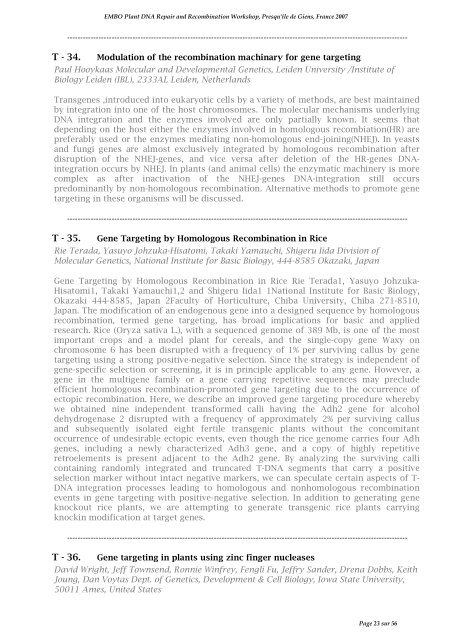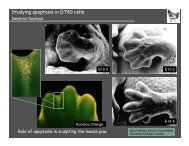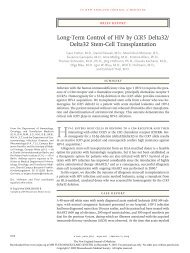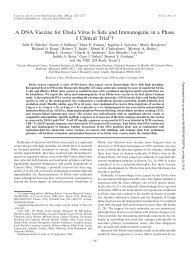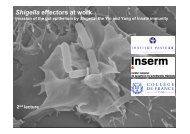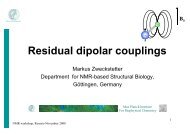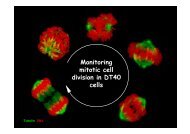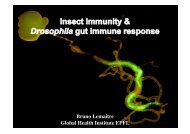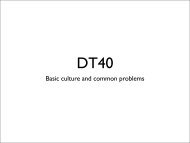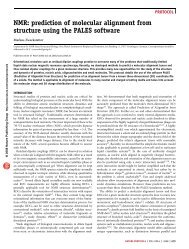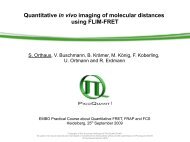pdf file - Events - EMBO
pdf file - Events - EMBO
pdf file - Events - EMBO
Create successful ePaper yourself
Turn your PDF publications into a flip-book with our unique Google optimized e-Paper software.
<strong>EMBO</strong> Plant DNA Repair and Recombination Workshop, Presqu'île de Giens, France 2007<br />
----------------------------------------------------------------------------------------------------------------------------------<br />
T - 34. Modulation of the recombination machinary for gene targeting<br />
Paul Hooykaas Molecular and Developmental Genetics, Leiden University /Institute of<br />
Biology Leiden (IBL), 2333AL Leiden, Netherlands<br />
Transgenes ,introduced into eukaryotic cells by a variety of methods, are best maintained<br />
by integration into one of the host chromosomes. The molecular mechanisms underlying<br />
DNA integration and the enzymes involved are only partially known. It seems that<br />
depending on the host either the enzymes involved in homologous recombiation(HR) are<br />
preferably used or the enzymes mediating non-homologous end-joining(NHEJ). In yeasts<br />
and fungi genes are almost exclusively integrated by homologous recombination after<br />
disruption of the NHEJ-genes, and vice versa after deletion of the HR-genes DNAintegration<br />
occurs by NHEJ. In plants (and animal cells) the enzymatic machinery is more<br />
complex as after inactivation of the NHEJ-genes DNA-integration still occurs<br />
predominantly by non-homologous recombination. Alternative methods to promote gene<br />
targeting in these organisms will be discussed.<br />
----------------------------------------------------------------------------------------------------------------------------------<br />
T - 35. Gene Targeting by Homologous Recombination in Rice<br />
Rie Terada, Yasuyo Johzuka-Hisatomi, Takaki Yamauchi, Shigeru Iida Division of<br />
Molecular Genetics, National Institute for Basic Biology, 444-8585 Okazaki, Japan<br />
Gene Targeting by Homologous Recombination in Rice Rie Terada1, Yasuyo Johzuka-<br />
Hisatomi1, Takaki Yamauchi1,2 and Shigeru Iida1 1National Institute for Basic Biology,<br />
Okazaki 444-8585, Japan 2Faculty of Horticulture, Chiba University, Chiba 271-8510,<br />
Japan. The modification of an endogenous gene into a designed sequence by homologous<br />
recombination, termed gene targeting, has broad implications for basic and applied<br />
research. Rice (Oryza sativa L.), with a sequenced genome of 389 Mb, is one of the most<br />
important crops and a model plant for cereals, and the single-copy gene Waxy on<br />
chromosome 6 has been disrupted with a frequency of 1% per surviving callus by gene<br />
targeting using a strong positive-negative selection. Since the strategy is independent of<br />
gene-specific selection or screening, it is in principle applicable to any gene. However, a<br />
gene in the multigene family or a gene carrying repetitive sequences may preclude<br />
efficient homologous recombination-promoted gene targeting due to the occurrence of<br />
ectopic recombination. Here, we describe an improved gene targeting procedure whereby<br />
we obtained nine independent transformed calli having the Adh2 gene for alcohol<br />
dehydrogenase 2 disrupted with a frequency of approximately 2% per surviving callus<br />
and subsequently isolated eight fertile transgenic plants without the concomitant<br />
occurrence of undesirable ectopic events, even though the rice genome carries four Adh<br />
genes, including a newly characterized Adh3 gene, and a copy of highly repetitive<br />
retroelements is present adjacent to the Adh2 gene. By analyzing the surviving calli<br />
containing randomly integrated and truncated T-DNA segments that carry a positive<br />
selection marker without intact negative markers, we can speculate certain aspects of T-<br />
DNA integration processes leading to homologous and nonhomologous recombination<br />
events in gene targeting with positive-negative selection. In addition to generating gene<br />
knockout rice plants, we are attempting to generate transgenic rice plants carrying<br />
knockin modification at target genes.<br />
----------------------------------------------------------------------------------------------------------------------------------<br />
T - 36. Gene targeting in plants using zinc finger nucleases<br />
David Wright, Jeff Townsend, Ronnie Winfrey, Fengli Fu, Jeffry Sander, Drena Dobbs, Keith<br />
Joung, Dan Voytas Dept. of Genetics, Development & Cell Biology, Iowa State University,<br />
50011 Ames, United States<br />
Page 23 sur 56


